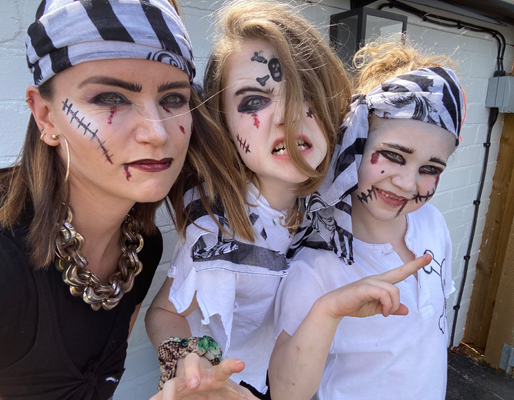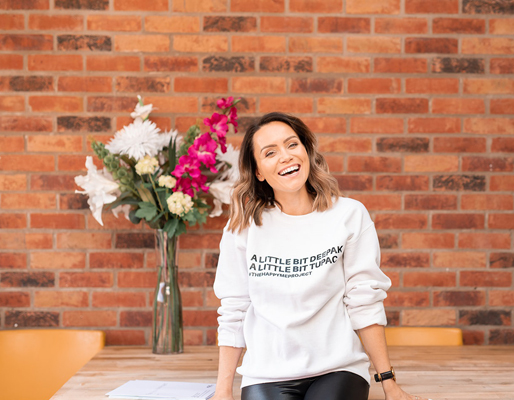Former Waterloo Road actress Holly Matthews today – on the third anniversary of husband Ross Blair’s death from a rare brain tumour – reveals how lockdown has highlighted how she navigates her “evolving” grief and manages her daughters’ fears that they’ll lose her, too.
Ross died from a rare brain tumour on July 29 2017 at the age of 32, leaving Holly, Brooke, nine, and Texas, seven.
The Covid-19 pandemic and lockdown has “stirred up” their grief as their devastating loss goes hand-in-hand with leading their best lives possible, as the loving husband and dad would have wanted for them.
“Three years on from Ross’s death and it still feels surreal,” said Coventry-based Holly, 36, who founded her Happy Me Project just months after Ross died to help other people facing painful challenges.
“In some ways, it feels a million years ago and in other ways just two seconds ago. Life moves forward and life is great a lot of the time, but he’s not here.
“Lockdown has stirred up our grief. I suffered a lot of anxiety at the beginning of lockdown as I felt empathy for so many people suffering bereavement. That brought my own grief to the fore. It is only now that I am allowing myself to focus on the grief I felt in Ross’ final days and my feelings about what we went through.”
“End of life care is very traumatic and it’s been too painful to process until now. But now I feel strong enough to sit with my feelings and start to work through them. I don’t think avoidance is a healthy way to cope with things but you don’t have to feel all your feels at once.”
“In the first year of grieving, you’re in shock and there’s so much to sort out and adjust to, you get by on adrenaline. The second year is more painful as it hits home this person isn’t coming back. Now the third year is having the strength to deal with my feelings about my last days with Ross. It’s a time of transition between the person I was with him and how his loss is shaping the person I’m becoming.”



Being in lockdown as “well and truly” tested Holly as a single mum.
“Like so many other people, I’m finding it challenging to balance looking after the girls, home schooling and running a home with my work,” she said.
And Covid-19 has triggered more heart breaking conversations with Brooke and Texas.
“After Ross died, the kids were scared I’d die. The pandemic has made them quite fearful again and they asked me, ‘Mummy, will you get Covid and die, too?’. After their daddy dying, their blueprint of the world is that the worst can happen.
“I can’t lie to them and say I’ll never get ill or die. As a family, we’ve always been honest and talked everything through. I acknowledge the girls’ fears but don’t want to scare them, so I encourage them to focus on the positive – that I’m young, healthy and I look after myself. Most of all, I tell them that what we’re happy and healthy in the ‘right now’ and that’s what we’ve got to focus on.”
They have been living in the moment during lockdown and TikTok fan Brooke and keen gymnast Texas have been creative with make-believe visits to different countries like France and Turkey.

“We marked Ross’ birthday in May with a Disney party day and a quiz as he loved quizzes. On Father’s Day, we had a pirate day, as that’s something the girls played with him. We talk about him every day and laugh about his jokes and quirks. I see him in both girls which makes me smile but sad that he isn’t getting to see the wonderful young people they are turning out to be. Brooke is strong-minded like Ross and Texas looks just like him and shares his thoughtfulness.”
And living in the “right now” helped Holly to cope with Ross’ diagnosis and the loss of the “love of her life.”
The couple met in 2008 at a Pimms promotion job.
“Before we met, I cringed if anyone mentioned love at first sight, but it was instant and his friends called us ‘Rolly’,” said Holly.
“I moved in with him the next day.”
Brooke was born in March 2011. A year later, the couple got married and Texas was born in February 2013.
Ross started suffering low moods and, around December 2013, he became increasingly depressed and fatigued. He suffered excruciating ‘ice pick’ headaches, which doctors put down to migraines, until scans revealed Ross had a brain tumour.
In February 2014, he had a five-hour operation when surgeons removed most of the tumour, but had to leave some due to its position.
Biopsy results showed it was a rare grade 4 primitive neuro-ectodermal tumour (PNET) Ross was given a 50-50 chance of surviving five years.



He had six weeks of radiotherapy followed by eight months of chemotherapy.
Two-and-half years later, Ross’ tumour grew back. In August 2016, surgery removed as much of it as possible.
“It was then I accepted Ross was going to die,” said Holly.
They concentrated on the ‘now’ and made as many happy memories as they could.
A few days after they got back from holiday in the Turks and Caicos Islands, Ross suffered a seizure on his 32nd birthday – May 17 2017. A scan revealed his tumour was growing back rapidly and there was nothing more doctors could do for him.
Ross was in hospital for two weeks and then moved into a hospice, where he passed away peacefully in Holly’s arms with his parents and sister at his side.
Now Holly is a high profile supporter for The Brain Tumour Charity and is backing their new relationship counselling service in partnership with Relate.
“The Brain Tumour Charity was always there offering support and guidance and when the end came for Ross that didn’t stop,” she said.
“I am constantly inspired by the work they do and there is such a need for their new counselling service. When your partner is diagnosed with a brain tumour, it changes your roles and dynamic. Ross and I pretty much split everything down the middle but he really struggled with his lack of independence, especially when he couldn’t drive and I had to drive him everywhere.
“In the last few months of Ross’ life, at times I felt more like his carer than his wife. When he went into a hospice, I could focus on being his partner again.”
After sharing her story on ITV’s Lorraine show last year and saying there’s no “right way” to grieve, hundreds of people got in touch with Holly after she struck a chord with them.



“Helping other people gives me so much, too,” said Holly, who is a health and wellbeing regional finalist in The Great British Entrepreneur awards.
“The ethos behind my Happy Me Project is ‘self-development doesn’t have to be fancy’. You don’t have to be a certain kind of person to be happy and create a life you love – you can be a person who’s been through trauma, loss, sadness and grief and you can take all that hardship and still have a fabulous life. I hope that people who are in a similar position can see me as hope, as someone who wasn’t and isn’t willing for sadness to be my whole life.”
Holly is also passionate about new research into brain tumours as The Brain Tumour Charity recently revealed it is funding £4.8 million research over the next five years.
“Everyone needs hope that their loved one may be the one who will be saved,” said Holly.
“Hearing that there was nothing more that could be done for Ross and that there was no hope of a cure was devastating. It’s like looking for a needle in a haystack but there isn’t even a needle yet.”
And to raise money to help find a cure and support people living with brain tumours, Holly, Brooke and Texas are taking part in The Brain Tumour Charity’s virtual Conquer the Climb challenge.
“I’m doing Everest and the girls are doing Snowdon on our stairs,” said Holly.

“It may be too late for Ross, but we want to help The Brain Tumour Charity give hope to other people.”
Now Holly strives to cherish every day with her daughters in tribute to Ross.
“My husband died at 32, far too young and it hurts, but to honour his life, I’m going to make damn sure me and his daughters live fully, live bravely and experience as much happiness as we possibly can.”
Sarah Lindsell, The Brain Tumour Charity’s chief executive, said: “We are so grateful for Holly’s continuing support. Her honesty in talking about the impact of Ross’ brain tumour diagnosis on their relationship, his death and her grief help so many people.
“We’re very proud Relate is partnering us in providing a counselling service to couples or individuals who are struggling to cope with changes to their relationship caused by a brain tumour diagnosis. Our Losing Myself report found that two in three people felt their diagnosis had a negative impact on their relationship with their partner, while 72% said it had affected physical intimacy. And, at a time when every penny counts more than ever, we’re grateful to Holly and all our wonderful supporters for taking part in Conquer the Climb.
“Covid-19 has put so much on pause but this brutal disease isn’t on pause – and nor is our work, which is why we are funding £4.8 million for vital research over the next five years.”
Originally published on The Daily Mail
Support and Information Services
Research & Clinical Trials Information
You can also join our active online community.
